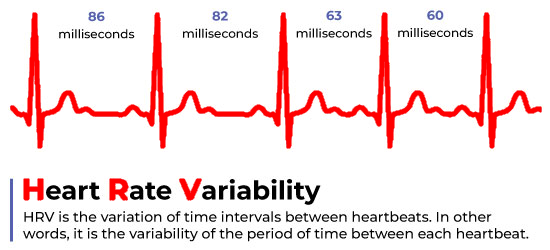A compilation of wearables capable of monitoring HRV
Introduction to Heart Rate Variability (HRV)
Heart rate variability (HRV) is a measure of the beat-to-beat variation in time of the heart’s rhythm and is an indicator of one’s physical and mental well-being. The autonomic nervous system controls HRV, regulating heart rate, blood pressure, breathing, digestion, and other important functions. A high HRV indicates a relaxed state, while a low HRV suggests stress or illness. The ability to track HRV has become increasingly popular in recent years, as wearable devices have evolved to provide comprehensive data on an individual’s heart health.

Benefits of Tracking HRV
One of the most important reasons to track HRV is to optimize physical exercise. When performing intense workouts, such as weightlifting or sprinting, it is beneficial to have a high frequency of heart rate updates in order to get the best results. For example, if you’re doing a bench press and want to know how hard you’re pushing, having your heart rate sampled multiple times per second would give you the most accurate readings and help you to understand your body’s response to the stress of different weights, allowing you to optimize your training.
Another important reason to track HRV is to monitor your overall health. Low HRV has been found in individuals with heart diseases, lung diseases, and psychiatric disorders, and maintaining a healthy lifestyle and staying physically fit has been shown to increase HRV. By paying attention to your heart health, you can maximize the benefits of your workouts and keep yourself in good shape.
Wearable Devices for HRV Tracking
Wearable devices that track HRV are available in a variety of forms, including smartwatches, fitness trackers, and armbands. The sampling frequency of these devices can vary, so it is important to choose one that best fits your needs. Some devices, like the Garmin smartwatch, are designed to sample your heart rate multiple times per second and record HRV data. Others, such as the Apple Watch, may only update your heart rate every few minutes, which may be sufficient for activities like watching TV or going for a walk.
Here is a list of some of the popular wearables that track HRV data:
- Oura Ring
- Whoop Band
- Apple Watch
- Garmin: Fenix 7 & Epix
- Fitbit: Charge 3, Charge 4, Charge 5, Inspire series, Versa series, Sense, Luxe devices
- Samsung: Samsung Galaxy Watch 4
- Polar: Polar Vantage V2, Polar Grit X Pro, Polar Ignite, Polar H10
- EliteHRV: CorSense
- Rhythm24: Scosche Armband Waterproof Heart Rate Monitor
- Biostrap
- VIITA: VIITA Race HRV
- Wahoo: Wahoo TICKR X
- Suunto: Smart Belt
When choosing a wearable to track your HRV, consider factors such as the device’s accuracy, ease of use, and compatibility with your existing fitness tracking tools. In addition, some wearables may provide additional features, such as tracking stress levels, that can give you even more insight into your health.
Enhancing Health through Heart Rate Variability Tracking
In conclusion, the ability to track HRV has become an essential tool for anyone looking to optimize their physical and mental well-being. Whether you’re a seasoned athlete or simply looking to improve your health, wearable devices that track HRV can provide valuable information and help you reach your goals. By monitoring your heart health, you can ensure that you’re always getting the most out of each workout and keeping yourself in great shape.